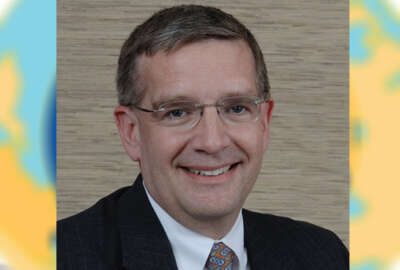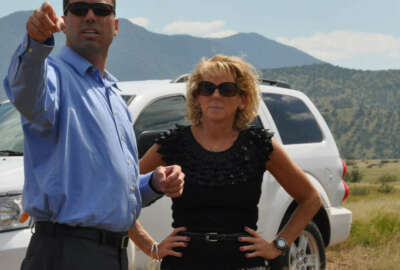
Senior executives earn top honors for research, new discoveries — and managing the shutdown
An elite group of Senior Executive Service members were honored this week for their groundbreaking research, massive modernization efforts and life-changing...
Best listening experience is on Chrome, Firefox or Safari. Subscribe to Federal Drive’s daily audio interviews on Apple Podcasts or PodcastOne.
Ask agencies how they managed to survive the 35-day government shutdown that got 2019 off to a chaotic start, and many will point to the career members of the Senior Executive Service.
Managing through the longest government shutdown in U.S. history wasn’t easy — the lapse impacted customer service levels, delayed work and created more for impacted agencies — but senior executives still managed to score some major achievements.
They managed to steer groundbreaking research and discoveries in the Arctic region. They led massive IT modernization efforts at their agencies. They revamped their agency ethics and harassment programs, discovered 2,500 new planets in other star systems and overhauled the disability claims process for veterans.
The Senior Executives Association honored 137 members of the SES with a Presidential Rank Award, one of the highest civil service honors, this year.
Distinguished Rank Awards are given to just 1% of the Senior Executive Service, while Meritorious Rank Awards are given to 5% of the SES.
“You all represent the best and the brightest and the most dedicated, committed professionals who lead,” Margaret Weichert, deputy director for management at the Office of Management and Budget, said Tuesday night at the Senior Executive Association’s ceremony of the Distinguished Presidential Rank Award winners in Washington. “You lead in challenging times, and you lead in easing times. And it’s mostly challenging times, because this is service. If it were easy, it wouldn’t be service.”
The recent 35-day government shutdown didn’t make it easy for these executives, many of whom were forced to confront questions and problems they had never encountered before during previous — and much shorter — lapses in appropriations.
And several senior executives were recognized with Presidential Rank Awards this year for their work during that time.
Like Mark Kaizen, who helped manage the IRS through the last government shutdown and steered the agency during the lead-up to tax filing season.
Or Hubert Hamer, who led an effort to quickly publish 40 sensitive data reports to meet the needs of the agriculture research market during the lapse.
Angelique Hebert organized employee informational outreach events and created an automated furlough system, which saved the Food and Drug Administration nearly $500,000 in time and costs to restart the agency after the last shutdown.
Besides creating the Transportation Security Administration’s PreCheck program, Mary Kate Whalen quickly identified authorities to help manage limited TSA screening resources across the country.
In many cases appointees in the Trump administration itself, Weichert said, learned just how often they relied on career federal leaders working “in the trenches” during those 35 days.
“The lapse in appropriations made it very clear to a number of folks who may have been unnuanced in their view about what happens if we don’t appropriate money, what happens if we don’t pay our federal workers,” Weichert said. “Americans do not want to believe that our feds have a hard time paying for gas to come to work. They do not want to believe that there are challenges that make it difficult for a TSA agent to actually show up at work and make sure their children are safe and taken care of.
“Learning is part of every leadership and growth opportunity,” she added.
It’s why the administration — as it places more emphasis on technical reskilling and upskilling initiatives — is also recognizing it could do more to develop and foster the next generation of career leaders, Weichert said.
Agencies can rely on artificial intelligence and robotics process automation to calculate retirement annuities or other benefits, but they can’t give feedback and foster an environment where employees can continuously develop.
“Robots are not good at judgment, context and tough human emotional challenging activities — leadership,” Weichert said. “We cannot replace leadership, but we don’t practice leadership. We don’t reward leadership.”
Agency senior executives themselves say they’re recognizing the challenge. First-line supervisors often score well above most others in leadership positions on the Federal Employee Viewpoint Survey, because they’re most in touch with the day-to-day operations of their workers, said Kevin Mahoney, chief human capital officer for the Commerce Department.
“Pick supervisors who you feel have the skills to manage, not who necessarily are your strongest technical [people],” he said. “More importantly once they’re in a supervisory job, it’s my job to run interference for them, to get the problems out of the way so that they can be successful. Too many times I see first-line supervisors being left on their own to figure things out, and then they get frustrated when things don’t work out. That’s especially important when it comes to [handling] performance issues. When you’re engaged in a performance issue and you have an employee who’s difficult to work with and you don’t have anyone backing you up as you go through the process, it can be a pretty lonely experience.”
The U.S. Agency for International Development surveyed its workforce and found the workload is often the biggest contributor toward employee stress and burnout, said Bob Leavitt, USAID chief human capital officer. First-line supervisors feel this workload stress most clearly.
“Supervisors in some cases are just not teed up for success,” he said. “They have not had access to not only the appropriate training designed for their situation or new responsibilities but also don’t readily have access to easily digestible, quickly accessible tools to support them.”
Today, USAID hosts one-on-one coaching and mentoring sessions with its supervisors.
“How do we provide and support them in developing coach-like skills … to further implement performance management reform? It’s more about improving, taking care of one’s team but also supporting their performance through ongoing, regular conversations,” Leavitt said.
Copyright © 2025 Federal News Network. All rights reserved. This website is not intended for users located within the European Economic Area.
Nicole Ogrysko is a reporter for Federal News Network focusing on the federal workforce and federal pay and benefits.
Follow @nogryskoWFED
Related Stories





